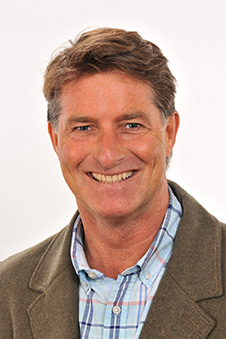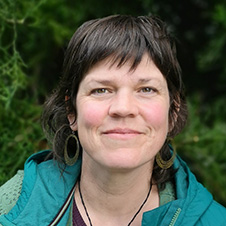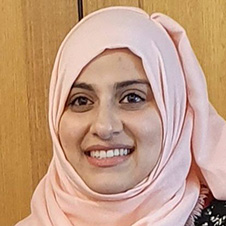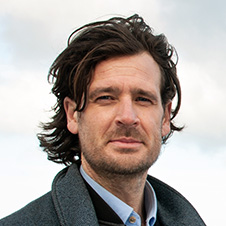An upcoming bicultural study aims to create a national action plan for spiritual care in the health system, in what is believed to be a first for Aotearoa New Zealand.

Associate Professor Richard Egan.
Study co-lead Associate Professor Richard Egan, from the Department of Preventive and Social Medicine, is one of 20 Otago researchers to receive funding in the latest Health Research Council funding round, totalling more than $5.2 million.
The study, which he will embark on alongside co-lead Associate Professor Natasha Tassell-Matamua from Massey University, aims to develop national recommendations and an action plan for spiritual care, including using Indigenous approaches.
Associate Professor Egan says much is unknown about spiritual care in Aotearoa healthcare.
“Spirituality is important for many people, especially in times of serious illness or dying, yet it receives little attention in policy formation, strategic planning, and healthcare practice.
“We know spiritual care improves healthcare experiences and outcomes, but we lack comprehensive knowledge about spiritual care needs in New Zealand.”
The funding, worth almost $1.4 million, will enable the research team to increase knowledge about the current state of spiritual care, needs and aspirations of the population, and improve spiritual care for all those in the healthcare system.
“For Māori, wairua or spirituality is often considered ‘the most essential requirement for health’, and this research will work in a bicultural way to better understand Māori spiritual care needs in a system that is inequitable based on current outcomes,” he says.
Thirteen Otago researchers were also awarded funding from the New Zealand Lottery Grants Board, totalling more than $1.2 million.

Dr Molly George.
Recipient Dr Molly George, from Social Anthropology, will use largely untapped data to reduce the struggles that former refugees face dealing with New Zealand’s health system.
Dr George and her colleagues have spent the past four years gathering stories from former refugees as they have navigated New Zealand’s health system.
“Our system is often radically different to what they have experienced previously, and their struggles and dissatisfaction are significant,” she says.
The Lottery Grant will enable her research team to draw on this under-utilised data, which is important because conducting qualitative research with refugees is known to be challenging, she says.
“It provides a rare opportunity to use this data and work with others to implement some real changes and improvements for this vulnerable population.”

Dr Sumera Saeed Akhtar.
Her team’s research findings will be given to New Zealand health providers to gather feedback and input, before they work with those providers on possible interventions to improve healthcare experiences and outcomes for former refugees.
Dr Sumera Saeed Akhtar, from the Centre for International Health, received a $160,000 Lottery Grant to address gestational diabetes among under-served South Asian women, for whom the risk of developing gestational diabetes mellitus is almost four times higher than other ethnicities.
She says the grant is an important milestone for her career and will assist towards improving the health equity for the South Asian population in New Zealand.

Dr Matthew Jenkins.
Dr Matthew Jenkins from the Department of Psychological Medicine at the University of Otago, Wellington, will work with Dr Victoria Chinn from Victoria University to build on a co-designed project delivering a holistic health and wellbeing programme to rangatahi experiencing early psychosis.
He said he was relieved to be awarded a Lottery Grant, as it was crucial towards delivering an “impactful” programme.
“Our previous participants pointed out the need for more knowledge around psychosis so that they can have a say in their own healthcare, the need for support in ‘getting the basics right’ (e.g. physical activity, cooking, smoking cessation), whakawhanaungatanga, and opportunities for leadership.”
Grants
Health Research Council Health Delivery Research Project Grant
Associate Professor Richard Egan, Preventive and Social Medicine, $1,399,923
Spiritual Care in Aotearoa New Zealand Healthcare
The restructuring of the Aotearoa New Zealand health system offers an opportunity to better cater to the spiritual care needs of the population. This research aims to develop national recommendations and an action plan for spiritual care in Aotearoa's healthcare system to provide excellent spiritual care across policy, institutional, and practice levels. The research team members come from various fields and stakeholder groups, including Māori members and external advisory groups. The project will employ a codesign multi-methods approach through three phases, including six studies to develop consensus-based recommendations and an action plan for spiritual care. This will have far-reaching implications and provide a comprehensive, research-based and Te Tiriti-aligned foundation for the provision of spiritual care in the publicly funded health system. The project will contribute to building the capacity of a highly skilled Māori workforce and develop Māori health knowledge by examining the spiritual care needs of Māori.
Professor Anna Ranta, Medicine, (UOW), $1,399,923
REGIONS II – Reducing stroke inequities for rural Māori
The Reducing Ethnic and Geographic Inequities in Stroke Care (REGIONS Care) study found that Māori people presenting to non-urban stroke hospitals experience the worst stroke outcomes in Aotearoa New Zealand. They also present with more severe strokes, likely indicating unmet need; whereas people with milder strokes may not present at all. This study has four aims. First, the researchers will work with rural whānau to codesign and evaluate targeted stroke interventions tailored to the local community's needs and priorities. Second, they will work with local whānau and Māori providers to determine the true stroke incidence in this population. This will help identify additional access barriers and allow for monitoring impact of service improvements. Third, they will increase research capability and capacity among rural whānau and providers. Fourth, they will conduct a cost consequence analysis to assess the monetary impact and resource implications of the tested interventions.
Dr Judy Ormandy, Obstetrics, Gynaecology and Women's Health (UOW), $1,394,123
Cervical cancer prevention in community services: a health delivery partnership
The introduction of HPV testing to Aotearoa in 2023 is anticipated to increase the acceptability of primary cervical screening. For this to transform into reduced cervical cancer rates experienced by Māori, more acceptable and accessible colposcopy services are required. This research is a partnership between the University of Otago, Te Whatu Ora Capital & Coast, three kaupapa Māori primary healthcare providers – Maraeroa Marae Health Clinic, Ora Toa Takapuwahia and Hora Te Pai and community health service Mana Wāhine. Building on the success of the research team’s HRC Activation Grant, they will: expand the implementation of co-located diagnostic and treatment services; develop resources with and for wāhine and providers; and inform future planning of colposcopy services for Māori to ensure long-term sustainability. Co-locating colposcopy services in culturally safe, accessible, community located and owned hubs, will improve timely engagement and ultimately improve outcomes for wāhine and their whānau.
Health Research Council Health Delivery Research Career Development Award
- Dr Sumera Saeed Akhtar, Centre for International Health, $115,021
Improving service delivery for NZ South Asian women with gestational diabetes - Dr Christine Barthow, Medicine (UOW), $146,888
Challenges to health equity: service provision in a low-cost general practice - Dr Kari Clifford, Surgical Sciences, $118,851
Effect of prophylactic antibiotics on anastomotic leaks in colorectal surgery - Dr Matthew Jenkins, Psychological Medicine (UOW), $164,547
Enhancing the health and wellbeing of rangatahi experiencing early psychosis - Dr Parimala Kanagasabai, Obstetrics, Gynaecology and Women’s Health (UOW), $134,560
A family centred group intervention for children with neurodevelopmental delay
Health Research Council Health Delivery Research Activation Grant 2
- Associate Professor Sara Filoche, Obstetrics, Gynaecology and Women's Health (UOW), $29,997
Building space for equity: Bringing culture centred design to hospitals - Dr Joanne Nunnerley, Orthopaedic Surgery and Musculoskeletal Medicine (UOC), $29,902
Should it hurt? – Experiencing clinical-based gynaecological procedures - Professor Richard Gearry, Medicine (UOC), $29,691
Consultation to develop a measure of RSE worker healthChristchurch School of Medicine, Health Sciences - Dr Matthew Jenkins, Psychological Medicine (UOW), $29,585
Exploring the personal geographies of rangatahi experiencing early psychosis - Dr Zohreh Tangrood, Orthopaedic Surgery and Musculoskeletal Medicine (UOC), $29,685
Comparing Nail versus Locking Plate in proximal humerus fractures - Professor Pauline Norris, Health Sciences Pacific, $30,000
Poverty alleviation and mental health: RCT acceptability and outcome measures - Dr Carolyn Clark, Medicine (UOW), $29,983
Investigation into development of wellbeing coaching programme in medical school - Miranda Buhler, School of Physiotherapy, $29,995
Empowering pathways to health for Pacific meatworkers - Mrs Jane Taafaki, Health Sciences Pacific, $27,801
Tauhi Vā: Building relationships between the Pacific community and pharmacists - Associate Professor Kirsten Robertson, Marketing, $28,051
Building dementia mate wareware friendly communities: Te whānau Māori experience - Associate Professor Lincoln Wood, Management, $30,000
Emergency Department Admission Prediction with Weather and Public Events - Dr Shyamala Nada-Raja, General Practice and Rural Health, $30,000
Co-designing and implementing an evaluation of a suicide prevention service
New Zealand Lottery Grants Board
- Dr Rory Miller, General Practice and Rural Health, $17,000
Siemens Atellica VTL-I Hs-cTnI reagent cards - Dr Olivia Harrison, Psychology, $77,464
Understanding the role of brain-body communication within symptoms of anxiety - Dr Mary (Molly) George, Social Anthropology, $98,142
Improving Healthcare for Refugees by translating health expectations and experience for NZ practitioners - Dr Chloe Campbell, Primary Health Care and General Practice (UOW), $103,636
Improving medicines safety for older New Zealanders on multiple medicines at hospital discharge - Dr Matthew Jenkins, Psychological Medicine (UOW), $105,634
Moving with psychosis: Delivery and evaluation of a health and wellbeing programme for rangatahi whai ora - Associate Professor Jennifer Jordan, Psychological Medicine (UOC) $111,960
Adapting an eating disorders risk reduction program for the Aotearoa-New Zealand context - Dr Andree Pearson, Pathology and Biomedical Science (UOC), $113,378
Hauora Manawa mō ngā Kaumāua me ngā Whānau/Heart health in older Māori and families - Dr Helen Fitt, Population Health (UOC), $114,816
Exploring access to food, social connection, and healthcare for residents of social housing - Dr Alisa Boucsein, Women and Children’s Health, $118,571
Automated insulin delivery to improve current care for Māori and Pacific peoples living with type 1 diabetes - Christine Barthow, Medicine (UOW) $119,947
Pacific aiga and general practice perspectives on intergenerational diabetes and an ideal model of care: A multiple case study - Dr John Woodfield, Surgical Sciences, $126,544
Colorectal Anastomosis and Bacterial Eradication (CABE) Trial: The effect of pre-operative antibiotics on Anastomotic Leaks in Colorectal Surgery - Dr Sumera Saeed Akhtar, Centre for International Health, $160,000
Lived Experiences, Knowledge and management of gestational diabetes mellitus (GDM) among New Zealand South Asian Women